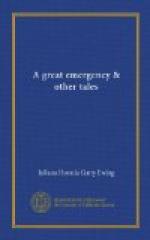“A sailor’s life is the life for me,”
I felt that it was the life for me also, and expressed myself so strongly to that effect that Mr. Rowe became alarmed for the consequences of his indiscretion, and thenceforward told us sea-stories with the obvious and quite futile intention of disgusting me with what I already looked upon as my profession.
But the barge-master’s rapid change of tactics convinced me more and more that we could not safely rely on him to help us in our plans.
About five o’clock he made tea on board, and boiled the water on the little stove in the cabin. I was very anxious to help, and it was I who literally made the tea, whilst Mr. Rowe’s steadier hand cut thick slices of bread-and-butter from a large loaf. There was only one cup and saucer. Fred and I shared the cup, and the barge-master took the saucer. By preference, he said, as the tea cooled quicker.
The driver had tea after we returned to the deck and could attend to the horse and boat.
Except the island in Linnet Lake, the most entertaining events of the first day of our voyage were our passing villages or detached houses on the canal banks.
Of the latter by far the most interesting was that of a dog-fancier, from whose residence melodious howls, in the dog-dialect of every tribe deserving to be represented in so choice a company, were wafted up the stream, and met our ears before our eyes beheld the landing-stage of the establishment, where the dog-fancier and some of his dogs were lounging in the cool of the evening, and glad to see the barge.
The fancier knew Mr. Rowe, and refreshed him (and us) with shandy-gaff in horn tumblers. Some of the dogs who did not, barked incessantly at us, wagging their tails at the same time, however, as if they had some doubts of the correctness of their judgment in the matter. One very small, very white, and very fluffy toy-dog, with a dove-coloured ribbon, was—no doubt—incurably ill-tempered and inhospitable; but a large brindled bull-dog, trying politely but vainly to hide his teeth and tongue, wagged what the fancier had left him of a tail, and dribbled with the pleasure of making our acquaintance, after the wont of his benevolent and much-maligned family. I have since felt pretty certain that Mr. Rowe gave his friend a sketch of our prospects and intentions in the same spirit in which he had written to Mr. Johnson, and I distinctly overheard the dog-fancier make some reply, in which the words “hoffer a reward” were audible. But the barge-master shook his head at suggestions probably drawn from his friend’s professional traditions, though the fancier told him some very good story about the ill-tempered toy-dog, to which he referred with such violent jerks of the head as threatened to throw his fur cap on to that of the brindled gentleman who sat dripping and smiling at his feet.
When Mr. Rowe began to tell him something good in return, and in spite of my utmost endeavours not to hear anything, the words “Linnet Flash” became audible, I blushed to hear the fancier choking over his shandy-gaff with laughter, and I feared at our project for settling on the island.




